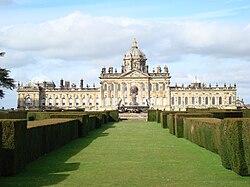Critical reception
Review aggregation website Rotten Tomatoes gives the film an approval rating of 62% based on reviews from 140 critics, with an average rating of 6.20/10. The site's critical consensus reads, "Suspenseful and beautifully mounted, Brideshead Revisited does an able job condensing Evelyn Waugh's novel." [5] Metacritic calculated an average score of 64 out of 100 based on 32 reviews, indicating "generally favorable reviews". [6]
Comparing the film to the earlier television adaptation, A.O. Scott of The New York Times called it "necessarily shorter and less faithful to Waugh's book, and also, for what it's worth, more cinematic. It is also tedious, confused and banal." He blamed director Jarrold and screenwriters Davies and Brock "for finding so little new or interesting to say... and for systematically stripping Waugh's novel of its telling nuances and provocative ideas." He concluded, "The long experience of English Catholics as a religious minority, the subtle gradations of class in the British university system, the crazy quilt of sexual norms and taboos governing the lives of young adults: all of this is what makes Brideshead Revisited live and breathe as a novel. None of it registers with any force in this lazy, complacent film, which takes the novel's name in vain." [7]
Roger Ebert of the Chicago Sun-Times observed, "While elegantly mounted and well acted, the movie is not the equal of the TV production, in part because so much material had to be compressed into such a shorter time. It is also not the equal of the recent film Atonement , which in an oblique way touches on similar issues. But it is a good, sound example of the British period drama; mid-range Merchant-Ivory, you could say." [8]
Mark Olsen of the Los Angeles Times said, "The film's strengths are in Waugh's story and not so much in the particular spin of these filmmakers. Their decision to turn up the volume on the homosexual undertones between Sebastian and Charles feels like an unimaginative nod to our modern times... In Brideshead, Jarrold seems too often to consciously be making an in-quotation-marks classy picture, much like last year's Atonement, in which the costumes and setting are just so, but the human drama gets lost amid the pictorial pleasantries. That the film is neither a true triumph nor a total disaster makes it somewhat difficult to justify revisiting Brideshead, apart from the hope it will inspire someone somewhere to pick up the book." [9]
David Wiegand of the San Francisco Chronicle called it "a very noble movie, which makes it interesting at times, but not often enough... What Jarrold has done right is to hire Andrew Davies to work with Jeremy Brock on the adaptation. There's no one better at dusting off English classics for the wide and small screens than Davies. He and Brock have done a competent job of culling just the right plot elements from Waugh's book and assembling them into a serviceable story. Whether you want to stick it out, however, is another matter entirely... Jarrold and his writers are more than respectful of the original source material, but compressing it all into two hours and change doesn't make for a terribly enjoyable film... Davies and Brock perform miracles in making this somewhat workable, but the ultimate impossibility of their task shows at the end." [10]
David Ansen of Newsweek suggested, "Think of Jarrold's briskly paced, stylish abridgment as a fine introduction to Waugh's marvelously melancholy elegy. It brings these unforgettable characters to life again, and if it sends people back to the novel, and back to the classic TV series... all the better. There's room for more than one Brideshead in this far less glamorous day and age." [11]
Owen Gleiberman of Entertainment Weekly graded the film B and commented, "Brideshead Revisited is opulent and watchable, yet except for Thompson's acting, it's missing something – a grander, more ambivalent vision of the England it depicts dying out. In the series, we looked at that palatial fortress of Brideshead manor and thought: Here, in one house, is a fading empire. In the movie, it's just sublime real estate." [12]
Dennis Harvey of Variety called the film "finely wrought" and added, "Purists may blanch at the screenplay's changes to the source material's narrative fine points, but its spirit survives intact... Goode provides a fine center of gravity as the middle-class tourist in heady but toxic upper-class realms. Thompson superbly etches a complex, eventually tragic portrait in her relatively few scenes." [4]
Geoffrey Macnab of The Independent rated the film three out of five stars and called it "flawed and uneven". He added, "In trying to shoehorn Waugh's novel into a two-hour movie, the filmmakers have left characters underdeveloped while skipping over plot points and condensing material that surely requires greater exposition. Boldly – and perhaps rashly – they have almost entirely dispensed with voiceover narration. Anyone expecting an equivalent to Jeremy Irons' evocative reading of Waugh's prose will be disappointed... On the credit side, this Brideshead boasts a handful of very strong performances... Emma Thompson makes a formidable Lady Marchmain and Michael Gambon is dependable as ever as Lord Marchmain but this Brideshead is slow to build momentum. At first, it is hard to engage emotionally in a story that leaps around in time and skirts over what should be key events, but the film grows progressively stronger and more moving." [13]

